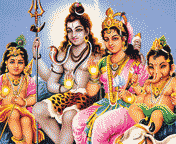|
|
||||||||||||||
|
Sue Olsson, an American tourist and researcher, sent me, Dr. Bob Holt, MD, the book shown above in 2001. It's coded message is that Jesus worshipped Shiva. Jesus, Devotee of Lord Shiva The
Kings of Kasmira "Rajatarangini of Kahlana Pandita" The Muslim path to Jesus in India has been easy to follow, because they have made the pathway very plain for us. They want us to see Jesus as a Muslim saint, although Mohammed will not be born yet for 5 centuries after Jesus passed on. At the least they hope we will see Jesus as a worshipper of Allah, of the "One God" of Islam and Judaism, which it turns out was not the face he turned towards his new followers and soon to be subjects as King Pravarasena of Kashmir. The Muslim trail is clear to them, but only partly true. To learn the whole truth will require some detective work and some real background knowledge of Jesus the Essene. The man who coached his son-in-law, the Apostle Paul to say, in 1 Corinthians 9:22 b "I am made all things to all men, that I might by all means save some." The truth of the matter is, Jesus had no problems at all relating to Hindus and Buddhists, because he shared their love towards their fellow men and their desire for religious liberty. Now we shall read the oldest and most reliable history of the Kings of Kashmir, and see Jesus portrayed, if not clearly, at least in an identifiable fashion. Kings of Kashmiri, Jogesh Chunder Dutt, 1979 Ed., page 37, "He (Meghaváhana) was succeeded by his son Shreshtasena who was also known as Pravarasena and also as Tungjina. He set up the images known as Mátrichakra and Pravaraeshvra, and several other images in old places." We already see we have difficulties to surmount here. This king has three names to start with, and none of them resemble Saint Issa, Yuz Asaph, or Jesus. However, in both cases we have three names, not one, so that is a start anyway. Jesus' fathers, according to the New Testament, were Joseph and God, depending on whether you believe in "virgin birth". Here we have another father named Meghaváhana. And Pravarasena starts his kingship by erecting or repairing and displaying a number of images, making him a Muslim "Antichrist" right from the start! Before we throw up our hands in total despair, however, we go to the next sentence, which reads: "The prince thought that the whole world was entirely subject to him, and dedicated Trigartta to the god Pravareshvara which he had set up." As we mentioned before, there has been no single person who could claim to rule the whole world since 59 AD any more than Jesus Christ, if indeed this is who we are talking about here. And so we will read on further. "He ruled over other kings, and reigned for thirty years with mercy." The very shortness of this account speaks well for our identification with Jesus. Surely if Jesus as Pravarasena had started a war or waged a campaign, this book would tell us so. So evidently he did none of this. Yet he ruled over other kings. How? They must have submitted to his rule voluntarily. And there we see it, "with mercy".--consistent with the one who said in the Gospels, "Come unto me, all ye who labor and are heavy laden, and I will give you rest. Take my yoke upon you, and learn of me; for I am meek and lowly in heart: and ye shall find rest unto your souls. For my yoke is easy, and my burden is light." Matt. 11:28-30. Evidently a lot of people, including kings, took him up on this offer for thirty years. Lastly, we read, "He always liked to use his jewelled sword." That's it. Next we're reading about his sons who replaced him after thirty years' reign! However, even this queer little verse, "He always liked to use his jewelled sword."-- is a hint we're talking about Jesus. Use it for what? Certainly not for chopping off people's heads, or the author would have said so. He enjoys going into great detail about such things in the rest of his book! Not in leading the people of Kashmir into battle. Not a single battle is described, and our author likes to describe battles also. The only thing left is for display. One doesn't take a jewelled sword into battle, anyway. Any old piece of steel with a sharp edge can be used to kill people. We remember another verse in Revelation, "And I saw heaven opened, and behold a white horse; and he that sat upon him was called Faithful and True, and in righteousness he doth judge and make war." Rev. 19:11 Heaven is here Kashmir, called "Paradise" even in the olden days. And a king who can rule here for thirty years "in mercy" fits the description of Rev. 19:11 exactly. Next we read in verse 12, "His eyes were as a flame of fire, and on his head were many crowns;…" The prince who "ruled the entire world" of "The Kings of Kasmiri". Now watch this, "…and he had a name written, that no man knew, but he himself." There's your hidden identity, a man with six names, most of them unknown to people of our generation, the ultimate readers of Revelation 19:12. Now for that jewelled sword. "And out of his mouth goeth a sharp sword, that he should smite the nations: and he shall rule them with a rod of iron: and he treadeth the winepress of the fierceness and wrath of Almighty God." Revelation 19:15 All we really see of this fierce picture of Revelation is that line saying, "He always liked to use his jewelled sword." But the picture of God here is the picture of Shiva, the potential judge and destroyer of the world. How can we connect the mild and gentle Jesus with Shiva? In the Muslim picture, never. In "The Kings of Kashmiri" picture, very clearly, in Appendix E, with a curse for our author for being so devious! Jesus
as a Devotee of Shiva Although it is far from obvious to start with, Appendix E, on page ix after page 303 is also about King Pravarasena. This becomes obvious only two thirds of the way down the page which states, The death of King Pravarasena is thus told." One now has to go back and endure the first part of the page with its unclear writing and abysmal grammar and realize that we're getting answered all our problems connecting Jesus with King Meghaváhana. Actually in this story Jesus is not Meghaváhana's son, but was made king by Shiva himself. As the story shows as it takes its devious way through our bewildered consciousness. "The visit of Shiva to the king is thus narrated: At Shri hill the prince met a follower of Shiva named Ashvapada, who gave him some roots, etc, to eat and said that in a former birth he (Ashvapada) had attained perfection and had asked the prince what he wanted, and the prince had asked to have a kingdom." This may be referring to the fact that Jesus, as a Messiah of the Essenes from 29-33 AD, had never really ruled a kingdom. Now that Jesus was here in Kashmir, the prophet sent by Shiva could refer to that "other life" in which they (Jesus and he) had had this former conversation. "And when I was thinking as to how your desire could be attained, Mahádeva said to me that you were his favored follower, and that he would fulfill your desire. Thus saying, Mahádeva disappeared. " Evidently, "Mahádeva" is a vision or apparition of Shiva, possible easy for Indians to see, but hard for us westerners. "These words reminded the prince of his former life, and with a desire for getting the kingdom, he worshipped Shiva for one year, after which period Shiva appeared to him in the form of a hermit, and promised to give him whatever he wanted." We can learn three things from this sentence. That Jesus was to change his religious beliefs. That he had a probationary period to do this (one year). And then he underwent a testing quite similar to that in which he was "tempted by Satan" in three of the Gospels. But this time the hermit is "Satan". "Again, the devil taketh him up into an exceedingly high mountain (the Himalayas), and showeth him all the kingdoms of the world, and the glory of them; And saith unto him, All these things I will give thee, if thou wilt fall down and worship me." Matt. 4:8,9. Jesus, in this Hindu story, is willing to do just that!
"The
prince wanted to be king of the world." Exactly what he
later thought he was as described in the short version on page 37-38!
"Wherefore do you ask.'
Questioned the god in the form of a hermit, 'temporary enjoyment instead of
salvation.?" This is a
rather obvious reference of Solomon's wiser choice of wisdom instead of
power and money. As recorded in 1 Kings 4:5, 13.
In which God gives him both the wisdom and the power and money.
But Jesus, as in the Gospels, is able to out talk and outwit even
Shiva, and is rewarded for his cleverness. "The prince answered. 'I asked you for the kingdom believing you to be a false hermit, for surely you are not Shiva, the great guru of the world. For the great give more than is asked of them, they will give milk if a thirsty man asks for water. You cannot know the pain which I feel for not getting salvation.' Shiva became glad, and showed his real person to him and said that 'in due course, when you will be reigning, Ashvapada by my orders will warn you of your salvation,' When Shiva disappeared, the prince took leave of Ashvapáda and came to Káshmira." Obviously, if Pravarasena was actually the son of the former king, all this would have been unnecessary. He would have become king on the death or abdication of his father, not be reduced to begging Shiva disguised as a hermit for kingship after a year's probation as a devotee of Shiva. Riding
Off into the Sky in a UFO! As we continue reading Appendix E of The Kings of Kasmira (after page 303) we know for sure we are reading about King Pravarasena of Kashmir because the next verse says, "The death of King Pravarasena is thus told." Once again this is a bit devious because no death is described, just an ascension as Jesus is described as making in the Gospels and Acts of the New Testament Bible, or in more modern terms, a ride aboard a UFO! "By the orders of Shiva, Ashvapáda addressed one Jayanta, Káshmirian Bráhmana, saying, 'I hope you are not weary of travelling; show this letter to the king.' But the Bráhmana said that he was weary of traveling, and could not set out that day. Whereupon Ashvapáda replied that he was a hermit of the class that carried human skulls, and as he had touched him, he should bathe." Let me interject here such bathing after touching a dead body is an important part of Mosaic law and Essene regulations. "So saying he pushed the Bráhmana into a pond. Rising from the water (now baptized), when Jayanta opened his eyes, he saw himself in his native country, and the servants of the king busy fetching water from the river for the king to worship." Worship who? Shiva of course!
"Jayanta found opportunity
to put the billet hastily in one of the water-vessels.
Now, when the king was bathing Shiva Pravaresha (showing Shiva as
the God to which he had earlier dedicated Trigartta), the letter dropped from the pot, he read it, and sent for Jayanta whom
he dismissed with royal presents. The
contents of the letter were as follows; --'You have done what should have
been done, you have given large gifts, and enjoyed what should have been
enjoyed, your years are on the decline, what more shall you do?
Come to the home of Shiva.'"
"The king ascended the
heaven piercing through the stony house and the people saw him going towards
Kailása across the clear
sky, like another sun. The
king reached the court of Shiva in his human body.
Even to this day may be seen the passage through which the king
made his exit into heaven. Jayanta who got riches by this strange means, built a village
inhabited by Bráhamanas,
and called it after his name."

|
||||||||||||||
|
If you have read the above SUMMARY of the Kashmir traditions of LORD SHIVA and at least SOME of the eight topics with LINKS above, you MIGHT be ready for SOME or ALL of the TOPICS with links below (Definitely HERETICAL to most!) JESUS as a DEVOTEE of LORD SHIVA!
|

